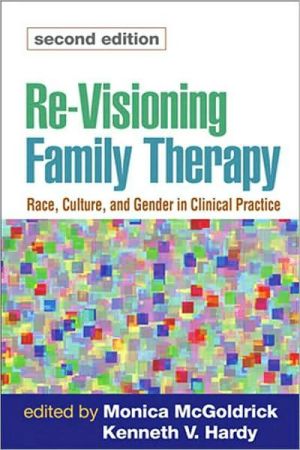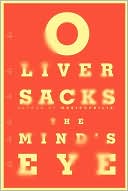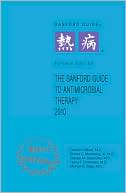Re-Visioning Family Therapy: Race, Culture, and Gender in Clinical Practice
Exploring the ways that clients' lives, and family therapy itself, are constrained by larger forces of racial, cultural, sexual, and class-based inequality, this groundbreaking volume expands the boundaries of the field and works toward truly inclusive clinical practice. Editor Monica McGoldrick¿whose earlier Ethnicity and Family Therapy provides in-depth portraits of the family systems of more than 40 ethnic groups¿here takes up vital cultural issues that cut across all ethnicities. Renowned...
Search in google:
Now in a significantly revised and expanded second edition, this groundbreaking work illuminates how racism, sexism, and other forms of oppression constrain the lives of diverse clients--and family therapy itself. Practitioners and students gain vital tools for reevaluating prevailing conceptions of family health and pathology; tapping into clients' cultural resources; and developing more inclusive theories and therapeutic practices. From leaders in the field, the second edition features many new chapters, case examples, and specific recommendations for culturally competent assessment, treatment, and clinical training. The section in which authors reflect on their own cultural and family legacies also has been significantly expanded. New in This Edition*20 entirely new chapters.*McGoldrick is now joined by Kenneth V. Hardy as coeditor.*Retains the same thematic focus as the prior edition, but numerous new authors and topics have been added. *Restructured for even greater utility as a text. Doody Review Services Reviewer:Gary B Kaniuk, Psy.D.(Cermak Health Services)Description:This book discusses family therapy within a broad cultural context, including race, gender, social class, sexual orientation, and spirituality. The authors show how oppression impacts the family and what therapists can do in clinical practice. This updates the 1998 first edition.Purpose:According to the editors, the goal of the book "is to transform the focus of our work beyond the interior of the family, so that we can begin to see how our clients' lives are constrained by larger societal structures and develop new ways of working based on a more contextual understanding of ourselves, our society, our history, and our clients' lives." Audience:The audience includes practitioners and students in graduate-level courses. Dr. McGoldrick is director of the Multicultural Family Institute in Highland Park, New Jersey, and associate professor of clinical psychiatry at Robert Wood Medical School, and Dr. Hardy is professor of family therapy at Drexel University. The contributors are affiliated with academic institutions or family institutes.Features:This book begins with theory underlying family therapy, including specific cultural factors. Next, the authors describe their individual experiences regarding culture and race. The book continues with how racial and cultural issues impact on therapy and clinical practice in general. Finally, the authors discuss how students should be trained. Case examples make the book come alive. In the introduction, the editors discuss how family therapy has evolved through the years. There is also an interesting discussion about the DSM (Diagnostic and Statistical Manual of Mental Disorders) and labels in general. However, my favorite part of the book is the description of the therapists' personal experiences. These narratives are fascinating reading and include many different cultural identities. The implications for training future family therapists are very important. There is no easy way to teach European-American students about racism and white privilege. The editors provide guidelines for training programs (chapter 37). In the last chapter, Dr. Hardy encourages trainees of color to become GEMM therapists (good, effective, mainstream, minority family therapists). Assessment:This excellent book does a nice job of showing how race, culture, and gender impact family therapy. It will open the eyes of students and give seasoned veterans food for thought, helping them consider their work given certain societal structures. Ultimately, we can conclude there are no easy answers, but the issues are presented very well here. This should be required reading for graduate students specializing in family work. This edition, a necessary update of a 10-year-old publication, adds 20 new chapters and revises and expands others.
I. Re-Visioning Family Therapy\ 1. Introduction: Re-Visioning Family Therapy through a Cultural Lens, McGoldrick\ 2. Theorizing Culture: Narrative Ideas and Practice Principles, Laird\ 3. The Cultural Meaning of Family Triangles, Falicov\ 4. Social Class as a Relationship: Implications for Family Therapy, Kliman\ 5. Beliefs, Spirituality, and Transcendence: Keys to Family Resilience, Walsh\ 6. Climbing Up the Rough Side of the Mountain: Hope, Culture, and Therapy, Hines\ II. Challenging Racism in Ideology and Training\ 7. Race and the Field of Family Therapy, Green\ 8. Training Programs: Guidelines for Multicultural Transformation, Green\ 9. The Dynamics of a Pro-Racist Ideology: Implications for Family Therapists, Hardy and Laszloffy\ 10. The Talking Oppression Blues: Including the Experience of Power/Powerlessness in the Teaching of "Cultural Sensitivity," Akamatsu\ III. What It Means to Be White\ 11. White Privilege: Unpacking the Invisible Knapsack, McIntosh\ 12. Body Ritual among the Nacirema, Miner\ 13. Dismantling White Male Privilege within Family Therapy, Dolan-Del Vecchio\ IV. Cultural Legacies\ 14. Black Genealogy Revisited: Restorying an African American Family, Pinderhughes\ 15. The Discovery of My Multicultural Identity, Colón\ 16. Belonging and Liberation, McGoldrick\ 17. Racial Unity from the Perspective of Personal Family History, Mahboubi and Searcy\ 18. No Longer an Orphan in History, Folwarski\ V. Therapy with Different Populations\ 19. The Double Binds of Racism, Mahmoud\ 20. African American Couples in Therapy, Boyd-Franklin and Franklin\ 21. African American Sibling Relationships, Watson\ 22. Intercultural Couples, Crohn\ 23. Marriages of Asian Women and American Military Men, Kim\ 24. The Families of Lesbian Women and Gay Men, Johnson and Keren\ 25. Latinas in the United States, Garcia-Preto\ VI. Migration\ 26. Clinical Reflections on Refugee Families, Mock\ 27. Migration and the Disruption of the Social Network, Sluzki\ 28. The Impact of Multiple Contexts on Recent Immigrant Families, Mirkin\ VII. New Approaches to Therapy Practice\ 29. A Fifth Province Approach to Intracultural Issues in an Irish Context, Byrne and McCarthy\ 30. The Challenges of Culture to Psychology and Postmodern Thinking, Waldegrave\ 31. The Cultural Context Model, Almeida, Woods, Messineo, and Font
Pt. I Theoretical Perspectives1 Introduction: Re-Visioning Family Therapy from a Multicultural Perspective Monica McGoldrick McGoldrick, Monica Kenneth V. Hardy Hardy, Kenneth V. 32 Transnational Journeys Celia Jaes Falicov Falicov, Celia Jaes 253 Migration and the Disruption of the Social Network Carlos E. Sluzki Sluzki, Carlos E. 394 Social Class: Implications for Family Therapy Tracey A. Laszloffy Laszloffy, Tracey A. 485 Spirituality, Healing, and Resilience Froma Walsh Walsh, Froma 616 Race, Reality, and Relationships: Implications for the Re-Visioning of Family Therapy Kenneth V. Hardy Hardy, Kenneth V. 767 Understanding Families in the Context of Cultural Adaptations to Oppression Vanessa McAdams-Mahmoud McAdams-Mahmoud, Vanessa 85Pt. II Cultural Legacies and Stories: Therapists' Experiences8 Finding a Place Called "Home" Monica McGoldrick McGoldrick, Monica 979 Black Genealogy Revisited: Restorying an African American Family Elaine Pinderhughes Pinderhughes, Elaine 11410 The Discovery of My Multicultural Identity Fernando Lopez-Colon Lopez-Colon, Fernando 13511 Our Iranian-African American Interracial Family Jayne Mahboubi Mahboubi, Jayne Nasim Mahboubi Mahboubi, Nasim 14612 Voluntary Childlessness and Motherhood: Afterthoughts Marlene F. Watson Watson, Marlene F. 15513 Grieving in Network and Community: Bearing Witness to the Loss of Our Son Jodie Kliman Kliman, Jodie David Trimble Trimble, David 16414 Going Home: One Orphan's Journey from Chicago to Poland and Back John Folwarski Folwarski, John 17215 Legacies of White Privilege Lisa Berndt Berndt, Lisa 18416 Transforming a Racist Legacy John J.Lawless Lawless, John J. 19117 The Semitism Schism: Jewish-Palestinian legacies in a Family Therapy Training Context Linda Stone Fish Fish, Linda Stone 19718 My Evolving Identity from Arab to Palestinian to Muslim Nuha Abudabbeh Abudabbeh, Nuha 20419 Biracial legitimacy: Embracing Marginality MaryAnna Domokos-Cheng Ham Ham, MaryAnna Domokos-Cheng 213Pt. III Racial Identity and Racism: Implications for Therapy20 The Dynamics of a Pro-Racist Ideology: Implications for Family Therapists Kenneth V. Hardy Hardy, Kenneth V. Tracey A. Laszloffy Laszloffy, Tracey A. 22521 White Privilege and Male Privilege: A Personal Account of Coming to See Correspondences through Work in Women's Studies Peggy McIntosh McIntosh, Peggy 23822 Dismantling White Male Privilege within Family Therapy Ken Dolan-Del Vecchio Vecchio, Ken Dolan-Del 25023 Latinas in the United States: Bridging Two Worlds Nydia Garcia-Preto Garcia-Preto, Nydia 26124 Therapy with Mixed-Race Families Tracey A. Laszloffy Laszloffy, Tracey A. 275Pt. IV Implications for Clinical Practice25 Working with LGBT Families Elijah C. Nealy Nealy, Elijah C. 28926 Gay and Lesbian Couples: Successful Coping with Minority Stress Robert-Jay Green Green, Robert-Jay 30027 Working with Immigrant and Refugee Families Marsha Pravder Mirkin Mirkin, Marsha Pravder Hugo Kamya Kamya, Hugo 31128 A Fifth-Province Approach to Intracultural Issues in an Irish Context: Marginal Illuminations Imelda Colgan McCarthy McCarthy, Imelda Colgan Nollaig O'Reilly Byrne Byrne, Nollaig O'Reilly 32729 Working with African Americans and Trauma: Lessons for Clinicians from Hurricane Katrina Nancy Boyd-Franklin Boyd-Franklin, Nancy 34430 Once They Come: Testimony Therapy and Healing Questions for African American Couples Makungu M. Akinyela Akinyela, Makungu M. 35631 Climbing Up the Rough Side of the Mountain: Hope, Culture, and Therapy Paulette Moore Hines Hines, Paulette Moore 36732 Interracial Asian Couples: Beyond Black and White Tazuko Shibusawa Shibusawa, Tazuko 37833 Working with Families Who Are Homeless Peter Fraenkel Fraenkel, Peter Chloe Carmichael Carmichael, Chloe 38934 Coyote Returns: A Reconciliation between History and Hope Robin LaDue LaDue, Robin 401Pt. V Implications for Training35 Teaching White Students about Racism and Its Implications in Practice Norma Akamatsu Akamatsu, Norma 41336 Visioning Social Justice: Narratives of Diversity, Social Location, and Personal Compassion Matthew R. Mock Mock, Matthew R. 42537 Re-Visioning Training Kenneth V. Hardy Hardy, Kenneth V. Monica McGoldrick McGoldrick, Monica 44238 On Becoming a GEMM Therapist: Work Harder, Be Smarter, and Never Discuss Race Kenneth V. Hardy Hardy, Kenneth V. 461Index 469
\ Reviewer: Gary B Kaniuk, Psy.D.(Cermak Health Services)\ Description: This book discusses family therapy within a broad cultural context, including race, gender, social class, sexual orientation, and spirituality. The authors show how oppression impacts the family and what therapists can do in clinical practice. This updates the 1998 first edition.\ Purpose: According to the editors, the goal of the book "is to transform the focus of our work beyond the interior of the family, so that we can begin to see how our clients' lives are constrained by larger societal structures and develop new ways of working based on a more contextual understanding of ourselves, our society, our history, and our clients' lives." \ Audience: The audience includes practitioners and students in graduate-level courses. Dr. McGoldrick is director of the Multicultural Family Institute in Highland Park, New Jersey, and associate professor of clinical psychiatry at Robert Wood Medical School, and Dr. Hardy is professor of family therapy at Drexel University. The contributors are affiliated with academic institutions or family institutes.\ Features: This book begins with theory underlying family therapy, including specific cultural factors. Next, the authors describe their individual experiences regarding culture and race. The book continues with how racial and cultural issues impact on therapy and clinical practice in general. Finally, the authors discuss how students should be trained. Case examples make the book come alive. In the introduction, the editors discuss how family therapy has evolved through the years. There is also an interesting discussion about the DSM (Diagnostic and Statistical Manual of Mental Disorders) and labels in general. However, my favorite part of the book is the description of the therapists' personal experiences. These narratives are fascinating reading and include many different cultural identities. The implications for training future family therapists are very important. There is no easy way to teach European-American students about racism and white privilege. The editors provide guidelines for training programs (chapter 37). In the last chapter, Dr. Hardy encourages trainees of color to become GEMM therapists (good, effective, mainstream, minority family therapists). \ Assessment: This excellent book does a nice job of showing how race, culture, and gender impact family therapy. It will open the eyes of students and give seasoned veterans food for thought, helping them consider their work given certain societal structures. Ultimately, we can conclude there are no easy answers, but the issues are presented very well here. This should be required reading for graduate students specializing in family work. This edition, a necessary update of a 10-year-old publication, adds 20 new chapters and revises and expands others.\ \ \ \ \ From the Publisher"Reading this book was a truly invigorating experience. It captures the complex contexts of clients' and practitioners' lives, and puts forth suggestions for practice that are inclusive of all whom we serve. Resisting pathologizing explanations, the book provides a depth of knowledge for helping families draw on their strengths during difficult times. Chapters show how exclusion and marginalization contribute to the problems that families experience, and highlight clinical intervention approaches that are transformative. The second edition squarely confronts new forms of oppression arising in changing global contexts. This book will be most useful for graduate-level training in social work and other helping professions."--Sarah Maiter, MSW, PhD, School of Social Work, York University, Toronto, Canada\ "This really is a terrific volume! The title aptly describes how McGoldrick, Hardy, and their contributing authors are 're-visioning' family therapy to reflect complex contemporary issues and approaches. This state-of-the-art work is a 'must have' for anyone who practices or teaches family therapy."--Beverly Greene, PhD, ABPP, Department of Psychology, St. John's University\ "McGoldrick and Hardy lead a wise council of practitioners to construct a vision of family therapy that is culturally and socially grounded. Rather than portraying individual cultural groups, the text addresses nuanced processes in understanding and working with difference in ways that broaden traditional conceptualizations and practices. This text will make a wonderful contribution to graduate courses addressing family treatment in all mental health-related disciplines."--Steven R. Lopez, PhD, Department of Psychology, University of Southern California\ "McGoldrick and her colleagues have again pushed the boundaries of family therapy with this splendid, updated second edition. Here is a vision of family therapy that embraces the lived complexity of diversity, addressing the intersections of race, ethnicity, class, gender, national origin, religion and spirituality, and sexual orientation. The expanded section on therapists' own cultural legacies and stories will stimulate self-reflection that is critical to developing cultural competence, while increased attention to training will aid students and teachers alike in grounding this vision in practice. I highly recommend this text."--Francis G. Lu, MD, Department of Psychiatry, University of California, San Francisco\ \ \ \ BooknewsSituating family therapy within its current cultural and sociological context, chapters reveal the biases that underlie prevailing conceptions of family health and pathology; influence the process and perceived goals of therapy; and impede therapists' vision both of their clients and themselves. Contributors also offer concrete suggestions for improving family therapy training and developing services that minority families may experience as more relevant to their lives. Annotation c. by Book News, Inc., Portland, Or.\ \








